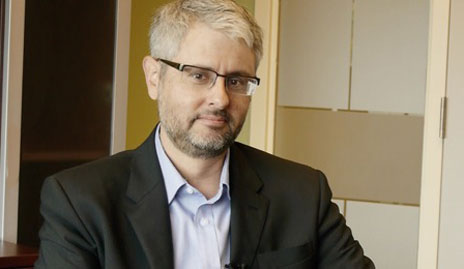
October 19, 2015, by ICCSR
Jeremy Hall steps in as ICCSR’s new director
ICCSR has appointed a new director, Jeremy Hall, who has arrived from Canada to take up the post .
Jeremy – who was previously a professor at the Beedie School of Business at Simon Fraser University in Vancouver and an associate professor at Haskayne School of Business at the University of Calgary – took up his new ICCSR post in August.
As well as his leadership role as director, in which he will help to set the direction of the ICCSR, he has also been appointed professor in CSR and sustainability, which will involve him in hands-on teaching and research.
Jeremy said ICCSR’s sheer presence in the sustainability field had persuaded him to move across the Atlantic to take up the post. ‘One of the things that impresses me about ICCSR is that it’s been here for 13 years,’ he said. ‘It’s one of the few of its kind – within a business school – that has been able to last that long. That’s a huge positive. Other bodies pop every now and then, but many don’t last long or are unwilling to dedicate faculty on a full time basis. It’s great that there are no fewer than eight faculty members here who are dedicated to teaching and research on CSR and sustainability. There are few other places where you would find that sort of commitment.’
Although a sustainability expert, Jeremy also has a background in management, with a specific interest in innovation, which he believes can help to resolve some of the key issues around sustainability but is often the cause of social and environmental problems. He is also keen to focus on the contribution that science can make to sustainability, in areas as diverse as food safety, social inclusion and climate change. ‘I believe sustainability is inherently multi-disciplinary because you’re dealing with financial, scientific and economic issues as well as environmental and social ones,’ he says. ‘So I’m hoping in future to collaborate with other faculties.’
Jeremy has worked on sustainability issues in the past with scientists and engineers, and is editor-in-chief of the Journal of Engineering and Technology Management, a technology and innovation management journal with a 2014 impact factor of 2.06. He gained his BSc in 1986 from Dalhousie University in Canada, where he also studied for an MBA (1992), before moving to Britain and gaining a D.Phil at the Science Policy Research Unit of Sussex University in 2000.
As the new director, he succeeds another Jeremy – Jeremy Moon – who had held the post of ICCSR director since our creation in 2002 and will retain his links with us.

Welcome Jeremy II,
I also share your view that “sustainability is inherently multidisciplinary”. In the view of Kilbert et al, sustainability is “inherently ethical, as it requires decisions to be rooted in moral principles, rather than based solely on economic calculation or convenience” (Working Toward Sustainability: Ethical Decision Making in a Technological World p. xvii)
It is my hope that you will not exclude the Religion faculty in your collaboration. According to Janine Benyus, “it will not be a change in technology that will bring us a sustainable future, but a change of heart” (Biomimicry: Innovation Inspired by Nature).
Prof Herman Edward Daly also agreed that sustainable development will require a change of heart, “a renewal of mind, and a healthy dose of repentance”, noting that “these terms are religious terms which are strongly resisted in academia”. He claimed that “the best way to marginalize an issue in academia is to classify it as religious” and “adopting an antireligious attitude is generally viewed as political correctness in our modern society” (Beyond Growth: The Economics of Sustainable Development, pp.23, 201)
Dr Sarah Speight also noted: “The barriers that are preventing real progress towards sustainability in higher education come down to the attitudes of staff and students … staff need to get beyond a fear that sustainability is a ‘new religion’ not open to questioning and debate and one that may be forced into the curriculum with a resulting diminishing of academic freedom and control” (https://www.smashwords.com/books/view/292679)